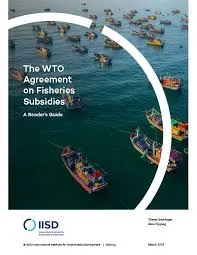London, UK, 16 September 2025 —
The European Union is celebrating the official entry into force of the World Trade Organization’s (WTO) Agreement on Fisheries Subsidies, calling it a historic achievement in the global effort to protect the world’s oceans. The landmark deal, the first multilateral trade agreement with environmental sustainability at its core, marks a significant step toward curbing harmful subsidies that contribute to overfishing and illegal fishing practices.
The agreement, which required ratification by two-thirds of the WTO’s 166 members, reached its threshold on September 15th, 2025. This success is the culmination of more than two decades of intense negotiations aimed at addressing a key driver of the global decline in fish stocks. While a total of $35.4 billion in subsidies are estimated to be provided globally to the fishing industry each year, around $22 billion are considered “capacity-enhancing” subsidies that encourage unsustainable fishing practices.
This first phase of the agreement, often referred to as “Fish 1,” contains several key provisions that immediately become legally binding for member nations. It prohibits subsidies to vessels and operators engaged in illegal, unreported, and unregulated (IUU) fishing, a practice that undermines global fisheries management and conservation efforts. The agreement also bans subsidies for fishing in unregulated high seas, as well as for overfished stocks, unless a country can prove it is implementing measures to rebuild the stock to a biologically sustainable level.

The EU has been a key advocate for the agreement and was one of the first major global players to ratify it in June 2023. Officials in Brussels have stated that the agreement aligns directly with the EU’s “European Ocean Pact” and UN Sustainable Development Goal 14.6, which mandates the elimination of harmful fisheries subsidies. The EU and its member states are also the largest contributors to the newly activated WTO Fish Fund, which is designed to assist developing and least-developed countries in implementing the new rules.
While the agreement is a major step forward, officials and environmental advocates stress that it is not the final solution. The deal does not yet include a broader prohibition on subsidies that contribute to overcapacity and overfishing in a general sense—a topic that remains under negotiation for a future, more comprehensive agreement known as “Fish 2.” Despite this, the current agreement is seen as a crucial foundation that sets a precedent for how trade policy can be used to achieve environmental goals. It provides a platform to prevent some of the most damaging subsidies and to promote greater transparency in the fishing industry.
The entry into force of the WTO Agreement on Fisheries Subsidies is being widely celebrated as a powerful example of multilateral cooperation. It demonstrates that countries can come together to tackle complex global challenges, creating a more resilient ocean and promoting more sustainable practices for coastal communities worldwide.
Headline Points:
* WTO Fisheries Agreement Enters into Force: A landmark WTO deal to curb harmful fisheries subsidies has become legally binding after reaching the required number of ratifications.
* EU Hails Historic Milestone: The European Union welcomed the agreement as a significant achievement for global ocean protection and a testament to multilateral cooperation.
* Prohibits Harmful Subsidies: The agreement bans subsidies for illegal, unregulated, and unreported (IUU) fishing, as well as for fishing on overfished stocks and in unregulated high seas.
* EU a Key Supporter: The EU, a major contributor to the newly established WTO Fish Fund, was an early ratifier and a strong advocate for the agreement’s implementation.
* A Foundation for Future Action: While a significant step, the agreement is the first phase of a broader effort to tackle overfishing, with further negotiations ongoing.
